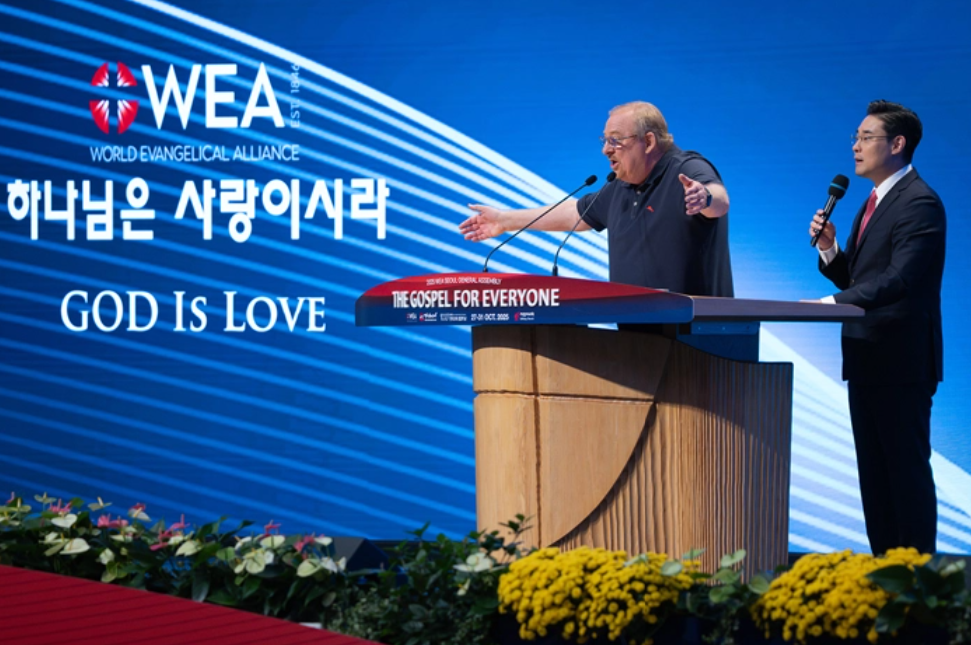SEOUL, South Korea — World-renowned pastor and prolific church planter Rick Warren says if Christians worldwide are going to complete the Great Commission by the 2,000th anniversary of the Church, it’s going to take radical giving, collaboration and a plan.
Speaking to delegates at the World Evangelical Alliance’s 14th General Assembly and members of SaRang Church on Wednesday night, Warren stressed that the window of opportunity is short, with only eight years left to complete the task.
To experience rapid growth of the Church and fulfill the Great Commission, Warren said there are three options to model. The first is the model of Jesus, which he addressed in his sermon on Monday night, listing five things Christian leaders must do to win the world for Christ. The other two models are the first church in Acts and the model of Apostle Paul.
Highlighting 10 ways Christians can emulate the first-century church and its exponential growth to finish the task, Warren noted that the fastest period of growth for Christianity was the first 330 years of the Church. “We went from 120 people in the upper room to, by [the year] 360 A.D., half of the Roman Empire had been saved — 30 million out of 60 million people.”
Looking at Acts 1 and 2, Warren listed the 10 action steps churches can implement today: pray for God’s power; translate God’s Word in every language; celebrate the diversity of believers; train every believer to preach the Good News; teach believers to do the Word of God; model love to the world; return to using homes for worship and Bible study; use worship as a joyful witness to non-believers; share resources and make financial sacrifices.
Warren shared his own process of modest living and sacrificial giving, noting that despite the monumental success of his books, The Purpose Driven Life and The Purpose Driven Church — the former being among the top bestselling books in the last 100 years that grossed hundreds of millions of dollars — he and his wife decided from their first year of marriage to live out radical giving, in both financially challenging and prosperous times.
“My wife and I got married 50 years ago, and we decided that every year of our marriage we would increase our giving by some amount,” he said, explaining that during “years where we had medical bills and the cupboard was bare and things were tight, we would still raise [our giving] maybe a quarter of a percent.”
“Why did I do that? Every time I give, it breaks the grip of materialism in my life.”
“Let me be very clear: I’m not a health and wealth teacher. I do not give in order to get. I give to be a blessing, not get a blessing. But in the economy of God, radical generosity will not go unrewarded,” he said.
“Every time I give, it makes me more like Jesus. Every time I give, my heart grows bigger.”
For the last 25 years, Warren said he and his wife, Kay, have lived on 9% of their income and give away 91% year after year. They’ve also set up three foundations. One serves people suffering from mental illness, another helps people with AIDS and other illnesses, and, lastly, Finishing the Task was established to help churches that want to do their part in completing the Great Commission.
Earlier this week, Warren lamented that some churches are not Great Commission churches, having given up on finishing the task long ago. But other churches, like SaRang, are working at speed to plant new churches worldwide.
He celebrated SaRang for its commitment to planting 500 churches in Europe, of which over 200 have already been planted. Yet he offered a challenge to members by asking them to increase their goal: “What would you be willing to sell so we could plant 1,000? What would you be willing to give up, as the Christians did in the New Testament, to help your church finish the task?”
Warren’s own church, Saddleback, which he founded in 1980 and led for over 40 years in California, is renowned for successfully planting a church in 197 countries.
Among the ways Saddleback models the first-century church is its focus on prayer.
“The problem is today, our churches are known for preaching, not for praying,” he lamented, adding that when believers start placing the same emphasis and importance on prayer as the first church in Acts, “then we will have the power like they had.”
Pointing to Acts 2:42, Warren stressed that they “devoted themselves to prayer.”
Another action Christians must collaborate on, he said, is translating the Bible in every language.
“Millions of people in the world still don’t have a Bible in their language,” he said. “There are still a couple of thousand languages in the world that don’t have a Bible. If we’re going to complete the Great Commission, we have to have God’s Word in everybody’s language. No one should have to learn a new language in order to hear the words, ‘Jesus loves you.'”
Of the 850 delegates in attendance at the WEA’s 14th general assembly, held on Oct. 27-31 and representing 124 countries, 36% came from Asia and 21% from Africa, with additional representation from Europe (12%), North America (17%), Latin America (5%), the South Pacific (3%), the Middle East and North Africa (3%), Central Asia (1.5%), and the Caribbean (1.5%).
The event features speeches by global church leaders, including world-renowned evangelist Stephen Tong, and panel discussions on numerous topics, including reconciliation, religious freedom, persecution, abortion, Artificial Intelligence, church growth, and the importance of disability ministries that are saving the lives of people often overlooked and underserved.
Originally published by The Christian Post
A panel at the World Evangelical Alliance General Assembly on Wednesday morning urged churches to engage artificial intelligence with a distinctly biblical ethic, framing AI as a people-shaping technology that demands theological clarity, pastoral care and practical safeguards.
